Ideas for eco friendly, beautiful cottage for rural Sydney
I love straw bale construction but am open to all styles of construction.
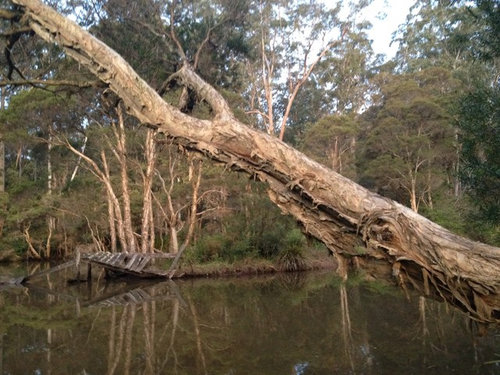
Comments (37)
fianou
9 years agoStrawbale would work really well for that temperature range! But my first thoughts were to something on stilts with pavilions... a bit like this
http://ecoshelta.com
Have you ever thought of using hempcrete? Its a lovely eco product, with great passive thermal properties and termite resistant, but it makes walls that are a lot thinner than strawbale.fianou
9 years agoI think pavilions clustered around the billabong would work for strawbale... connected by a boardwalk along the water. You could tuck them in amongst the tea trees ( are they tea trees?) without having to clear as much. pavilion style for strawbale gives you the chance to hone your skills. Start with a shed or utility building and then move on to the house buildings. Although pavilions in such a cold climate may not be as as desirable!
There are a few strawbales here.
http://www.houzz.com.au/photos/strawbale-house-/p/24Clever Closet Company
Original Author9 years agoHi Flanou, I have thought of this style, it doesn't look as good from a passive heating cooling point of view to me. I like being on the ground but am thinking that there might be benefits from building on stilts too.
I don't know about hemp rest, will check it out, thanks!fianou
9 years agolast modified: 9 years agoThese guys are listed on houzz and have a lot of strawbale builds. They seem to be in your area.
http://www.houzz.com.au/pro/setsquaresam/viva-living-homesClever Closet Company
Original Author9 years agoI think given it will be small it will be one structure, rather than a series of structures, the cottage looks over the billabong, but is about 50 meters way from itfianou
9 years agoI think with the trees around it could be an idea to feature grey weathered timbers... in my mind they would link the colours of the bush to the house. Maybe you could reclaim some timbers, and leave the decking to age...Clever Closet Company
Original Author9 years agoFianou, I'm just at the concept stage now, not really concerned about colours, more building methods and eco concepts than finishing details, as said it isnt in the trees, that's the view of the billabong, not whereh the cottage will be.Undercover Architect
9 years agoIf you feel like making a trip to Byron in June, you could learn how to do it yourself with this workshop ... it looks amazing! It's happening at The Farm in Byron Bay, which is a gorgeous newish venue in Ewingsdale.
http://www.milkwood.net/course/natural-building-workshop-150611/Clever Closet Company
Original Author9 years agoHi undercover architect, yes, I'm familiar with the courses. I don't really intend doing the building myself as I really don't have time or the ability to build single handedly. I will happily pay someone to do it, just wanting to get ideas on options and compare things like container homes, straw bale, pole houses, prefab options etcSusanne Oliver-Dearman
9 years agoYou may be interested in the primarily earthen architecture of earthbag or superadobe. It's not everyone's taste. It's earth in bags tamped down till it rings hard. Plastered. I know of s couple of Australian builders who work in it. This is a backyard bedroom study still in progress. It's lovely. It's Eco creeds could be higher but when it's 45° outside its 26° inside. No air conditioning. Well heat it with a tiny stove. You could use as rocket stove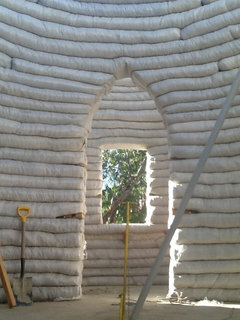
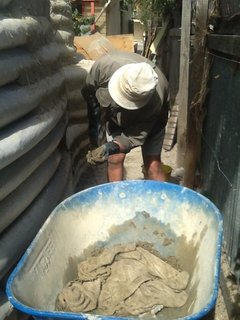
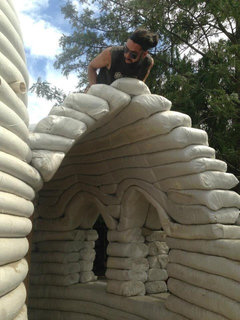
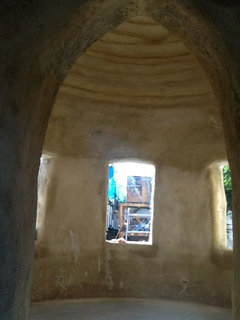
Clever Closet Company
Original Author9 years agoInterresting Susanne, thanks, I havn't seen this before. Do you then render the interior and exterior?Susanne Oliver-Dearman
9 years agoRender and paint. We built domes but it can be rectilinear. I know of a couple in country Vic who built their own whole house with scoria filled bags in a butterfly-ish shape. With a roof with wide eaves. Natural paints and plasters unlike ours. It's in s eucalyptus grove and withstands snow. Divine.Susanne Oliver-Dearman
9 years agoPhoto one is superadobe in Nepal. An orphanage which is still standing! The second is a community project in response to the Haiti Earthquake. The third is a private home in California. The last is ours. If you Google earthbag housing or superadobe you'll find a great variety on most continents. Spain has some great examples. Some African builds are gorgeous. It's a flexible architecture open to vernacular interpretations and creative flair. Enjoy.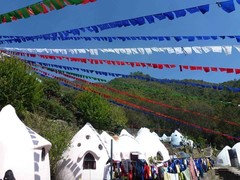
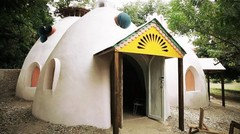
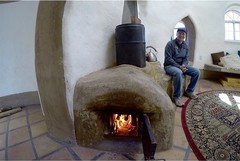
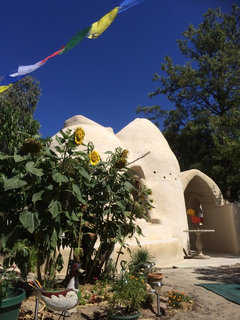
Luke Buckle
8 years agoSowden Building Solutions
8 years agoHempcrete would work a treat - I'm currently building/renovating a property in Sydney and it has been wonderful to work with.
On top of thermal requirements we selected Hempcrete for its acoustic qualities. It is also non-combustible.
With the right detailing and base you could build it on stilts and use a lightweight mix for your floors (as insulation not structure) and roof for a full thermal envelope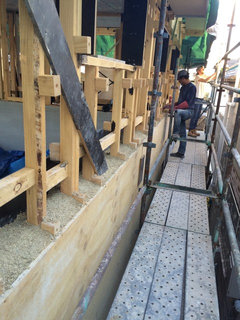
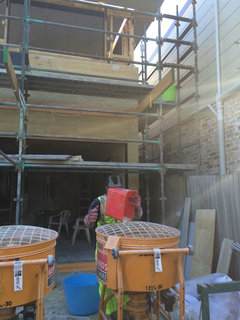
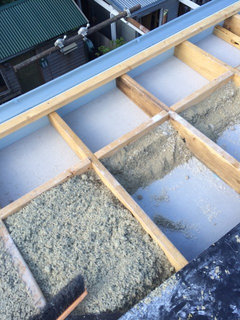
Clever Closet Company
Original Author8 years agoHi Snowden, what are the benefits of hemp rate over straw?Sowden Building Solutions
8 years agoHi Sally,
Compared to Straw Bale Hempcrete has the following benefits:
Thermal mass compared to just insulation
Rodent proof due to lime.
Thinner walls.
More options on detailing.
Still locks in carbon while setting over the years.
Great as a rotational crop for farmers.
Nick SowdenClever Closet Company
Original Author8 years agoThanks Nick, interesting, although I love the thick, rounded walls of straw, is that still possible?
Clever Closet Company
Original Author8 years agoNick, I'm interested in the product, wht's the best way to find out more about it? Are there any displays?
Rammed Earth Enterprises
8 years agoHi Sally, Rammed Earth walls would work
perfectly in this environment, we currently only build walls throughout the
state of Victoria, so we couldn’t help, however rammed earth has excellent
thermal properties and is a sustainable building material. In Castlemaine
(Central Victoria) it was 41 degrees yesterday and with no air-conditioning our
home was a comfortable 26 degrees. In winter with no heating the lowest our
house gets to is 13 degrees, and with a wood heater it is very comfortable
(between 18 and 22 degrees). Excellent solar passive design is VITAL to create
a sustainable home and achieve these benefits. If you want to read further we
have a lot of information on our website about thermal mass (click here) and on
the many other benefits of rammed earth walls (click here). In regard to what
you said about the BAL rating, rammed earth is rated to BAL Flame Zone, which
is the highest BAL rating there is. We’ve written a blog post on our website
about building in a bushfire prone area – which you could read for some
interesting facts and ideas that might also help you!I’ve attached a few photos of the vastly
different styles that can be achieved with rammed earth, but if you have a look
at our Houzz page we have more pictures up there. I’ve done a quick google
search and there are rammed earth builders in Sydney who I’m sure can help you
out.
We hope this helps!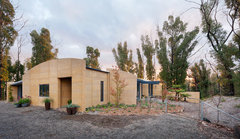 External Rammed Earth Walls · More Info
External Rammed Earth Walls · More Info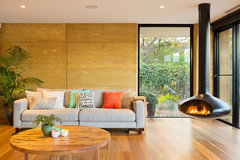 Internal Rammed Earth Walls · More Info
Internal Rammed Earth Walls · More InfoClever Closet Company
Original Author8 years agoThanks rammed earth for so much great information.
the homes look lovely.
how do they go with cooling down after a prolonged hot period?Rammed Earth Enterprises
8 years agoHey Sally,
This is from the ‘Thermal Mass in Summer’ section from our website,"With correct eave overhang on the North of your building & thermal
mass being shielded from direct solar gain we can control the increase in the
ambient air temperature of the building.During the day heat gains from external temperature, the occupants of
the building, and any electrical lighting and equipment, is absorbed by the
exposed thermal mass of the building and releases stored cool within the
thermal mass, thus limiting the temperature rise within the space to be within
acceptable levels for human thermal comfort.By the end of the day the thermal mass of the building has in turn
warmed up, and now as external temperatures reduce the heat can be released and
the thermal mass cooled down ready for the start of the next day. However this
"regeneration" process is only effective if the building is
ventilated at night when the external air temperature has dropped below the
internal temperature, to carry away the heat that has been absorbed during the
day. This can be achieved through naturally ventilating buildings (opening
windows etc.) or the use of automated ventilation systems.This reduces or totally eliminates the need for artificial cooling
systems to be installed, thus reducing the overall energy consumption of the
building to attain a comfortable living environment."When temperatures do not drop at night for 3-4 nights, our houses are still far more comfortable than outside, warmer than it would be if
night ventilation could be achieved, but still a comfortable temperature. In
our house we just use ceiling fans during those in-between days! We find that
even when it is warmer in our houses in prolonged hot periods than it would be
with air-conditioning, the quality of the air and feel of being inside the
house is much nicer than what it would be with the everyday use of an air-conditioner – not to
mention benefit that not using air-conditioning has on the environment.
Hope this answers your question :)Envirotecture
8 years agoWe've done a couple of Hempcrete projects. Agree with all of nicks comments especially regarding design flexibility.
It goes without saying that you need to get the passive design right:
Your home.gov.au
Good luckClever Closet Company thanked EnvirotectureZetta Kanta
7 years agoPeople in Russia and Mongolia where temperatures are extreme in winter would cover their walls (from inside) with wool felted rugs. It served as an insulator and was ascetically pleasing to the eye.
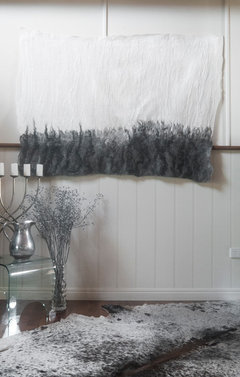 Heart Felt by Zetta Kanta · More Info
Heart Felt by Zetta Kanta · More Info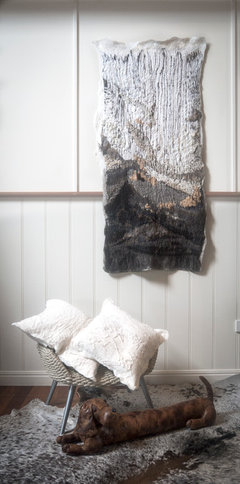 Heart Felt by Zetta Kanta · More Info
Heart Felt by Zetta Kanta · More Info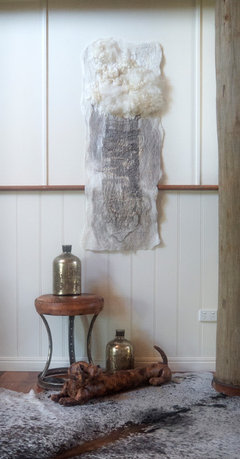 Heart Felt by Zetta Kanta · More Info
Heart Felt by Zetta Kanta · More Info

Reload the page to not see this specific ad anymore
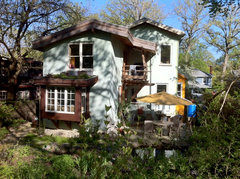
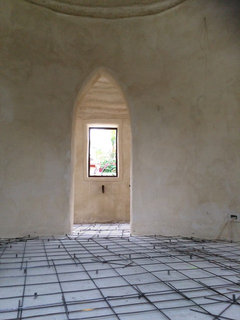
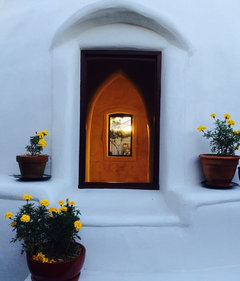
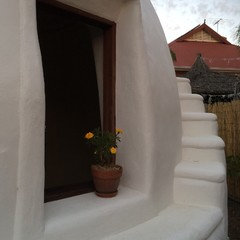
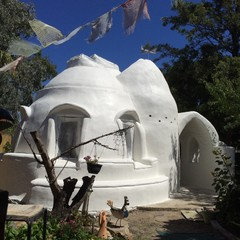
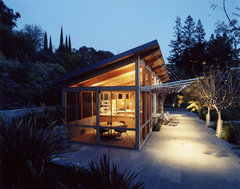
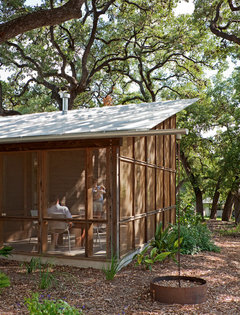
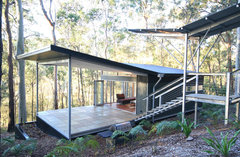
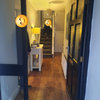
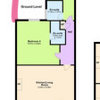
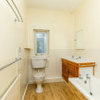
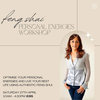
Sowden Building Solutions